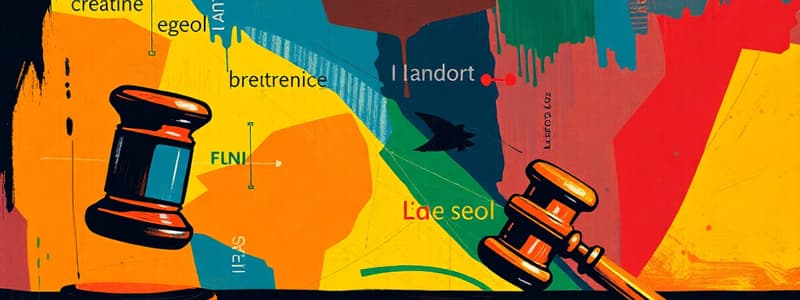Podcast
Questions and Answers
What is the purpose of plea bargaining in the legal process?
What is the purpose of plea bargaining in the legal process?
- To eliminate all charges against a defendant.
- To reduce charges and sentencing in exchange for a guilty plea. (correct)
- To delay the trial process indefinitely.
- To change the judge overseeing the case.
Which type of evidence is defined as directly proving a fact?
Which type of evidence is defined as directly proving a fact?
- Direct evidence (correct)
- Circumstantial evidence
- Indirect evidence
- Hearsay evidence
What defines an indeterminate sentence?
What defines an indeterminate sentence?
- A fixed length of time for the sentence.
- A range of time set for the sentence. (correct)
- No conditions for release after serving time.
- An unlimited prison term.
What is the role of jury nullification?
What is the role of jury nullification?
What does the harmless error rule state regarding appeals?
What does the harmless error rule state regarding appeals?
What is the primary aim of problem-solving courts?
What is the primary aim of problem-solving courts?
What characterizes privileged communications in a legal context?
What characterizes privileged communications in a legal context?
Which of the following is true about intermediate sanctions?
Which of the following is true about intermediate sanctions?
Flashcards
Information/Indictment
Information/Indictment
A formal accusation of a crime, presented by a grand jury.
Arraignment
Arraignment
Formal court appearance where accused is informed of charges, enters a plea, and appointed counsel.
Discovery
Discovery
Exchange of evidence between prosecution and defense.
Plea Bargaining
Plea Bargaining
Signup and view all the flashcards
Direct Evidence
Direct Evidence
Signup and view all the flashcards
Hearsay Evidence
Hearsay Evidence
Signup and view all the flashcards
Jury Nullification
Jury Nullification
Signup and view all the flashcards
Habeas Corpus
Habeas Corpus
Signup and view all the flashcards
Study Notes
Criminal Procedure
- Information/Indictment: Formal charge/accusation of a crime, issued by a grand jury.
- Arraignment: Defendant is informed of charges, enters a plea, and is assigned a lawyer/public defender.
- Discovery: Exchange of evidence between prosecution and defense.
- Plea Bargaining: Defendant pleads guilty in exchange for reduced charges or a lighter sentence.
- Opening Statements: Arguments by both the prosecution and defense outlining their case. Not necessarily evidence based.
- Privileged Communications: Convo's protected by law (e.g., attorney-client).
- Direct Evidence: Evidence directly proving a fact (e.g., eyewitness testimony).
- Indirect Evidence: Evidence used to infer a fact (circumstantial).
- Hearsay Evidence: Out-of-court statements used to prove the truth of the matter asserted.
- Jury Nullification: Jury can acquit despite evidence of guilt.
- Specific Deterrence: Punishment focused on preventing a particular individual from reoffending.
- General Deterrence: Punishment intended to deter the wider community from committing crimes.
- Indeterminate Sentences: Min/max sentence imposed.
- Determinate Sentences: Fixed sentence length.
- Probation: Allows the offender to remain in the community under supervision.
- Intermediate Sanctions: Punishments/alternatives between probation and jail (e.g., community service).
- Interlocutory Appeals: Appeals of non-final trial rulings.
- Harmless Error Rule: Appellate courts won't overturn mistakes if they didn't significantly affect the outcome.
Habeas Corpus and Courts
- Habeas Corpus: Legal process requiring a person under arrest to appear before a judge to determine if detention is lawful.
- Problem-solving courts: Justice system collaboration to assist individuals with mental health or substance use disorders to avoid reoffending.
- Restorative Justice: Process that involves reintegrating an offender with those affected by the crime to repair harm caused.
Studying That Suits You
Use AI to generate personalized quizzes and flashcards to suit your learning preferences.




